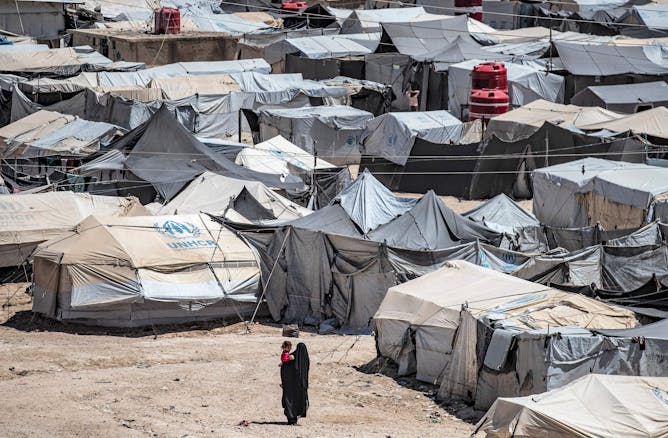|
Every day brings more evidence of the death and devastation wrought by Russia’s invasion of Ukraine. Photos of corpses in the street, bombed-out buildings and survivors clutching whatever they can salvage from their old lives are impossible to miss – or forget. It’s hard to know when the war will end, but it’s clear that recovery will take years for decimated cities such as Severodonetsk and Bucha.
Ideally, humanitarian efforts will accomplish more in Ukraine than they have in Syria, where Russia has backed state-sponsored violence that began in 2011. Having studied aid efforts there for years, Tufts researchers Kimberly Howe and Elizabeth Stites sum up what the world should learn from Syrian aid. One takeaway: Humanitarian efforts usually work best when local organizations are allowed to take the lead, without being controlled by outsiders.
Also today:
|

Millions of Syrians remain displaced from the conflict that began in 2011.
Delil Souleiman/AFP via Getty Images
Kimberly Howe, Tufts University; Elizabeth Stites, Tufts University
Russia has used similar tactics in both countries, including bombings that flatten homes, schools, hospitals and key infrastructure. The humanitarian needs are vast.
|
Environment + Energy
|
-
Yuko Sato, Iowa State University
Bird flu is highly contagious in domestic flocks, and a major outbreak is underway in the US. A veterinary scientist explains what consumers need to know.
|
|
Arts + Culture
|
-
Maggie Cao, University of North Carolina at Chapel Hill
The ‘fool the eye’ cakes hearken back to popular paintings from another period in American history when there was anxiety over fakes, fraudsters and misinformation.
|
|
Health + Medicine
|
-
Arash Javanbakht, Wayne State University
By creating both an urgent need for mental health care and the need to prevent the spread of COVID-19, the pandemic is enabling telemedicine to go mainstream.
-
Amitai Abramovitch, Texas State University
While only about 20% of people would qualify for a formal diagnosis of a mental disorder, more than 60% express symptoms of those disorders – and those symptoms can lead to cognitive difficulties.
|
|
Science + Technology
|
-
Scott Ruoti, University of Tennessee
Here’s what happens when you scan one of those ubiquitous two-dimensional black-and-white patterns.
|
|
Politics + Society
|
-
Matthew Delmont, Dartmouth College
Comprised mostly of Black soldiers, the Red Ball Express transported supplies day and night and is given credit for providing a strategic advantage over the Nazi military.
-
Ayesha Jalal, Tufts University
Pakistan Prime Minister Imran Khan dissolved Parliament rather than face a no-confidence vote. The Conversation asked an expert: What happens next?
-
Joseph Wright, Penn State; Abel Escribà-Folch, Universitat Pompeu Fabra
In recent years, Western governments have, in effect, aided the rise of personalist dictators in Russia, Iraq, Libya, North Korea and Venezuela.
-
Mia Bloom, Georgia State University
An expert on rape during war examines the emerging evidence from Ukraine that Russian soldiers raped Ukrainian women and explains the role rape plays in conflicts.
-
Nina Srinivasan Rathbun, USC Dornsife College of Letters, Arts and Sciences
Despite decades of progress on nonproliferation, Russia’s new threats of nuclear strikes bring to mind that convincing countries to reduce their nuclear weapons has long been very difficult.
|
|